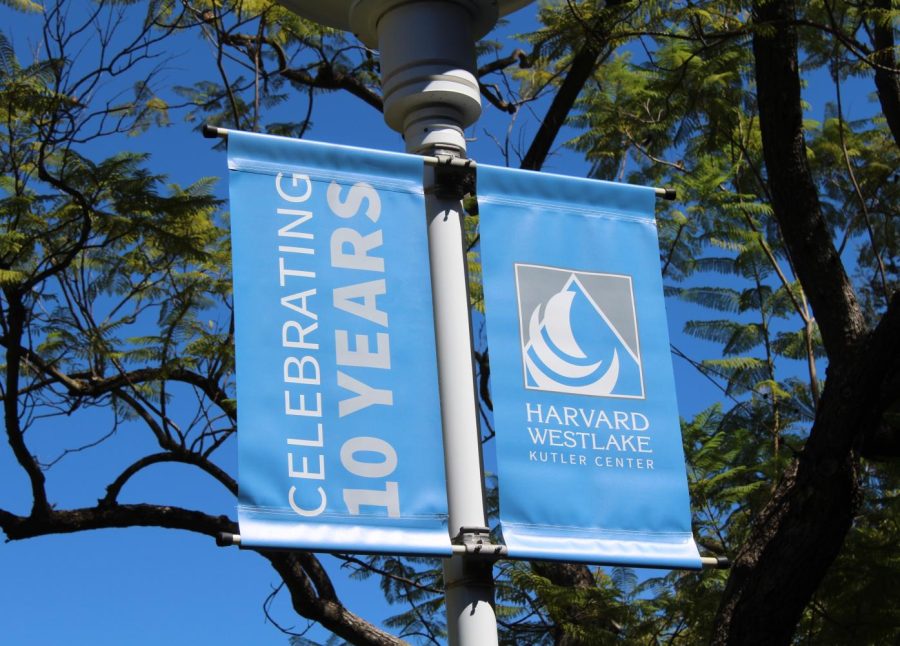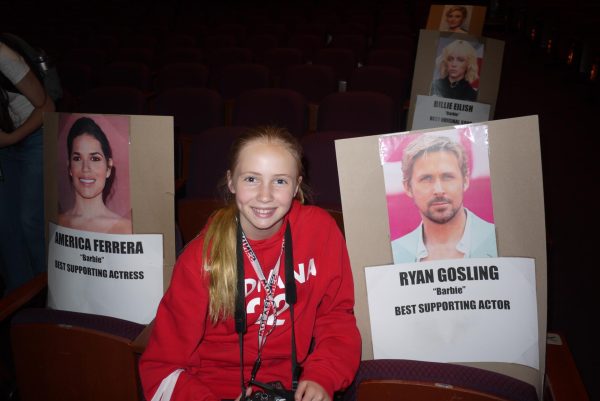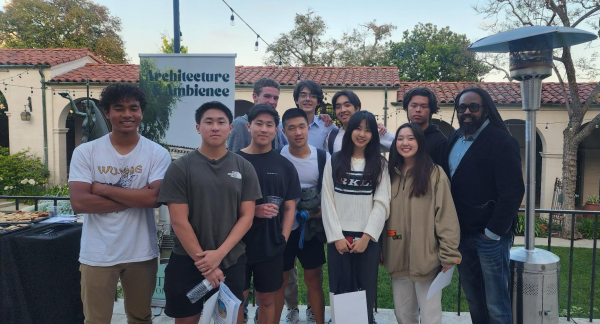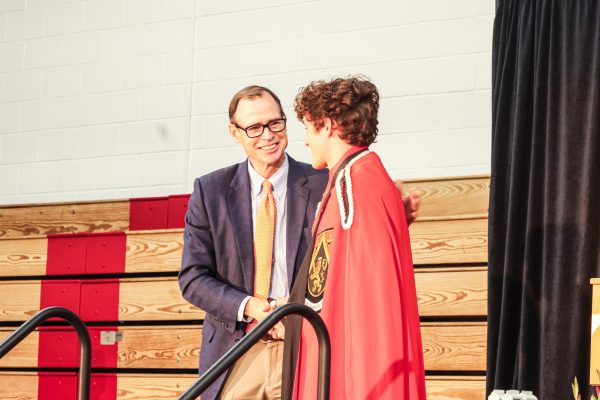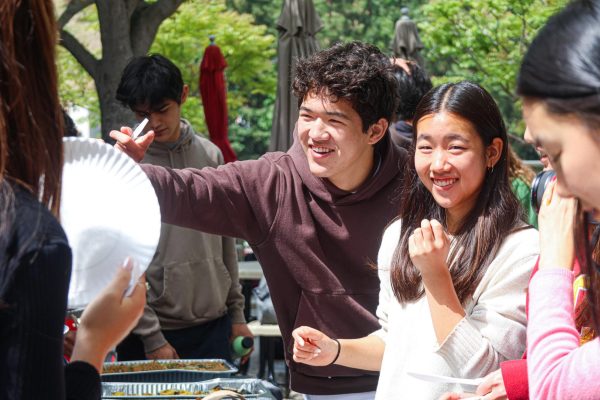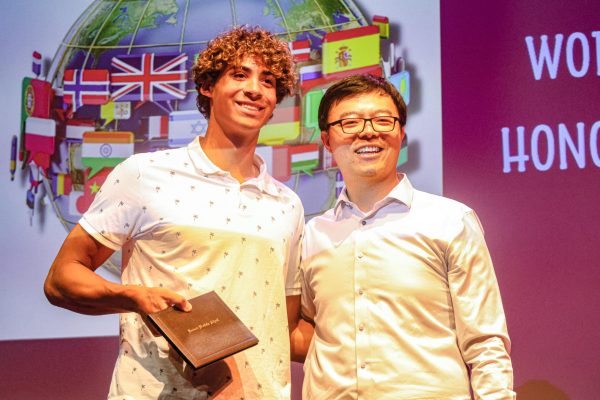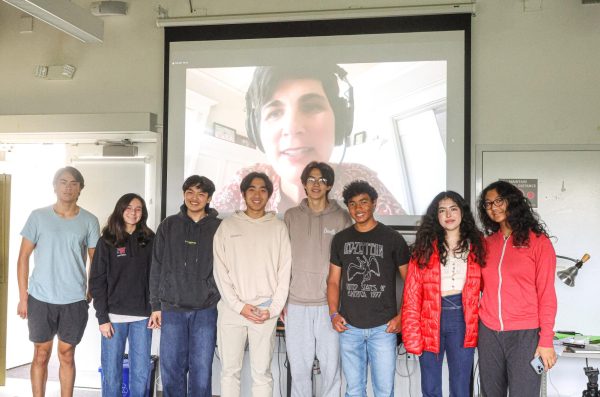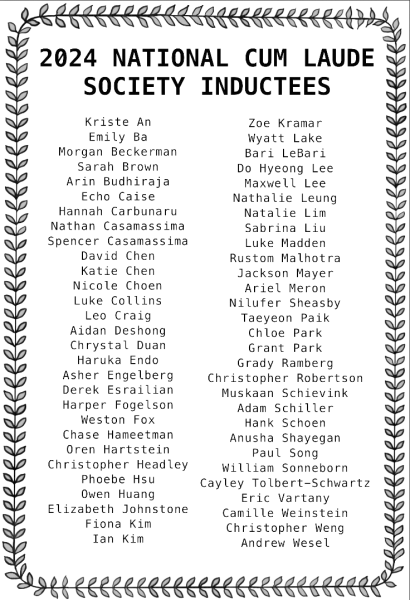Kutler Center Turns 10
Signs posted around campus celebrate the Kutler Center’s tenth anniversary.
September 28, 2022
The Kutler Center is celebrating its 10th anniversary this month. Founded in September 2012 and named after the late Brendan Kutler ’10, the center houses the school’s Department of Interdisciplinary Studies and Independent Research (ISIR).
Kutler Center and Summer Programs Director Jim Patterson said the school’s first conversations about interdisciplinary studies came out of a national discussion about school curriculum.
“If you look at independent schools across the country, many are steeped in the traditional liberal arts and sciences curriculum,” Patterson said. “However, in higher education, there was an interest in trying to explore the intersection between different disciplines, which began to permeate secondary schools as well.”
When Kutler died unexpectedly during his senior year December 29, 2009, his parents, Jon and Sara Kutler, worked with the school to find a way to honor him. History and ISIR Department Head Larry Klein, who served as the first Director of the Kutler Center, said the school’s limited discussions of interdisciplinary curriculum development consolidated when the Kutlers approached the school.
“The creation of the Kutler Center gave an avenue for the coalescence of ideas about innovation in approaches and coursework to move beyond traditional curriculum,” Klein said. “After Brendan passed away, his parents became in conversation with [former Head of School] Jeanne Huybrechts, who had been envisioning pushing the school forward in its approaches, to best capture the essence of Brennan and his experience at the school, through the creation of the [Kutler Center] and its vision of facilitating the unbonded pursuit of intellectual curiosity and discovery.”
Kutler enjoyed making connections between disciplines including computer science, cinema studies, Japanese language and culture, music and photography, often taking classes without credit because of his love for learning, according to Patterson. Klein said the Kutler Center was inspired by Kutler’s appreciation of the intersection between different disciplines.
“The inspiration for what was planned and what [the Kutler Center] has become was really grounded in Brendan himself,” Klein said. “Brendan was a student who had an enormous intellectual curiosity, and he bent the boundaries of what academic pursuit and the quest for knowledge look like.”
Huybrechts proposed official plans for the Kutler Center to the Kutlers in February of 2010. In order to create a physical space for the Center, the Mudd Library was renovated, and a building connecting the library and the Seaver Academic Center was constructed. After 19 months of construction, the Kutler family cut the ribbon and officially opened the Kutler Center at a ceremony Sept. 28, 2012.
Head of Upper School Beth Slattery said instead of honoring Kutler through a traditional scholarship, the Kutler Center has allowed his legacy to actively contribute to student life.
“Brendan was my student, so I was there for the inception and the meeting where we decided that instead of having a scholarship in Brendan’s name, we would create this thing,” Slattery said. “I’m so proud that it actually came to fruition [because] I remember saying to Sara Kutler that one day, ‘We’re going to actually say his name every day on campus,’ and we do say Kutler every day.”
Patterson became the new Kutler Center Director and Klein became ISIR Department Chair in 2015. Patterson said although the Kutler Center still works to promote interdisciplinary studies and independent research, he has worked to ensure it pushes the school’s curriculum forward and supports students’ passions.
“In many ways, the original vision of the Kutler Center still guides us,” Patterson said. “One piece that originally was not explicitly stated is that the Kutler Center helps the school’s curriculum and pedagogy, which has become much more important recently. Another piece that wasn’t explicitly stated is the idea that the Kutler Center is a place where students can come to find support for their interests and passions.”
In addition to the courses offered by the ISIR Department, the Kutler Center offers a variety of events and programs. Some of these programs include Junior and Sophomore Fellowships, which provide grants for students to pursue an independent research project during the summer, the Scholar in Residence program, in which the school brings scholars and speakers to share their knowledge with the community, support for students who are taking gap years and partnerships with community organizations.
President Rick Commons said the Kutler Center gives students the option to pursue a passion in either an academically intense or relaxed setting, depending on what they want.
“I think the variety of courses and experiences is what is most exciting,” Commons said. “The Kutler Center just expands the way in which students can learn at Harvard-Westlake, as they can double down on an area that they really are excited about or can step off the treadmill of academic intensity.”
Each year, the Kutler Center gives the Two Hats Award, named to reflect Brendan Kutler’s interest in multiple fields and his habit of wearing two baseball hats, to a junior who reflects Brendan’s values. Fernanda Herrera ’23, who won the award last year, said she thinks the Kutler Center is important because it allows students to learn about unique topics and express themselves.
“In a school as competitive and time-consuming as Harvard-Westlake, it’s important for students to continue to nurture their love for the pursuit of knowledge,” Herrera said. “I’m not saying the other core classes don’t accomplish that, but I do believe there is something very special about actively choosing niche topics to study for the sake of learning. Our community greatly benefits from the Kutler Center because it allows us to express ourselves as well as form bonds with other students over topics that might not be brought up in everyday conversation.”
History Teacher Lilas Lane, who teaches From Sappho to #MeToo: Intro to Gender Studies within the Kutler Center, said she is impressed by the ways the Kutler Center helps students take advanced classes that are often only available in higher education.
“The Kutler Center is one of the best examples of how special Harvard-Westlake is as an academic institution,” Lane said. “The opportunity for students to explore such a wide range of innovative, topical and sophisticated electives, courses that most students do not get a chance to take until college, if ever, is remarkable.”
History Teacher Erik Wade, who teaches Black Diasporas: Hip Hop and Modern America in the Kutler Center, said while interdisciplinary studies have been prominent for decades, the work the Kutler Center is doing prepares students for their future.
“Some say interdisciplinary studies is the future of the work we’re doing,” Wade said. “In reality, this approach goes back to the 60s, 70s and 80s. If we’re not doing interdisciplinary work or exposing our students to it, we’re doing them a disservice in preparation for higher education, their careers and their everyday lives.”
Lane said appreciates the Kutler Center providing her the opportunity to teach a subject she is passionate about.
“What I love best about the Kutler Center is that these courses draw on the particular strengths and interests of the faculty members who teach them,” Lane said. “The Kutler Center gives faculty an opportunity to teach to our interests and passions, and to teach students who share those interests.”
Slattery said the Kutler Center represents the school’s progression into an institution that allows students to truly learn and grow, moving beyond a traditional form of education that emphasizes exam performance.
“The Kutler Center is one of the best examples of how we’ve evolved as an institution to become a better place for a wider variety of kids and actually think about how we support kids and help them grow,” Slattery said. “Sometimes, it used to feel like our definition of great was Advanced Placement scores and test scores, but to me, that doesn’t mean nearly as much as having people leave this place and feel like they grew intellectually and interpersonally.”































